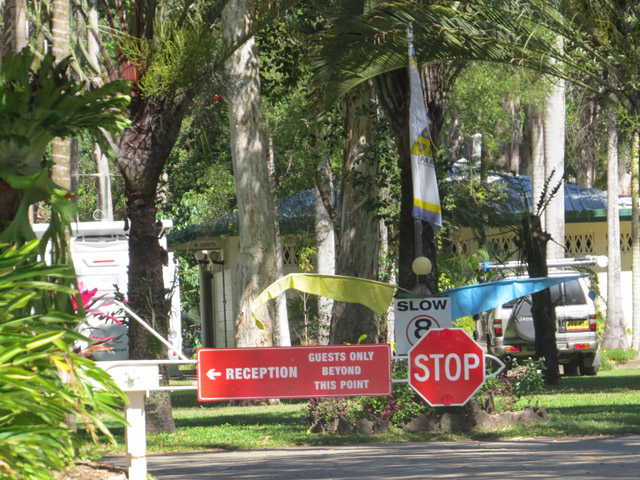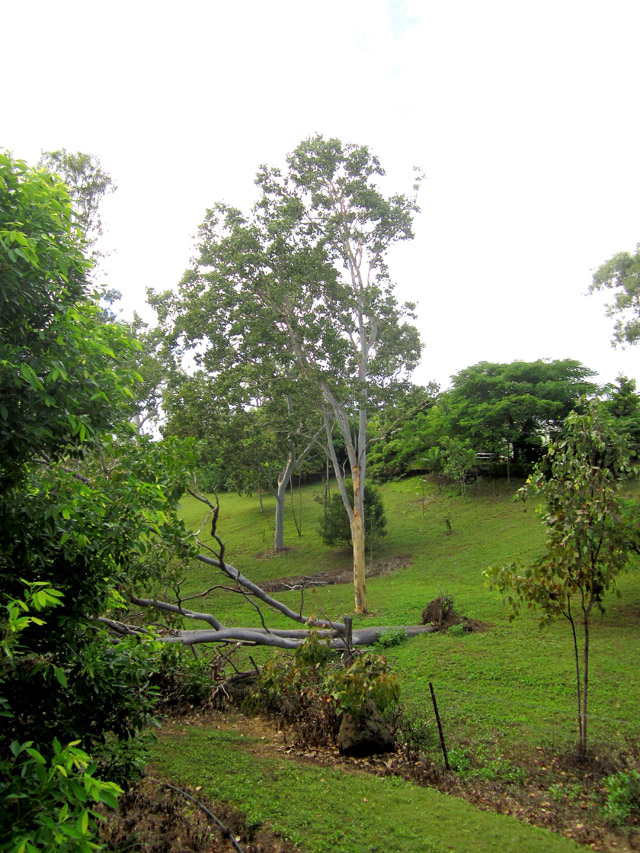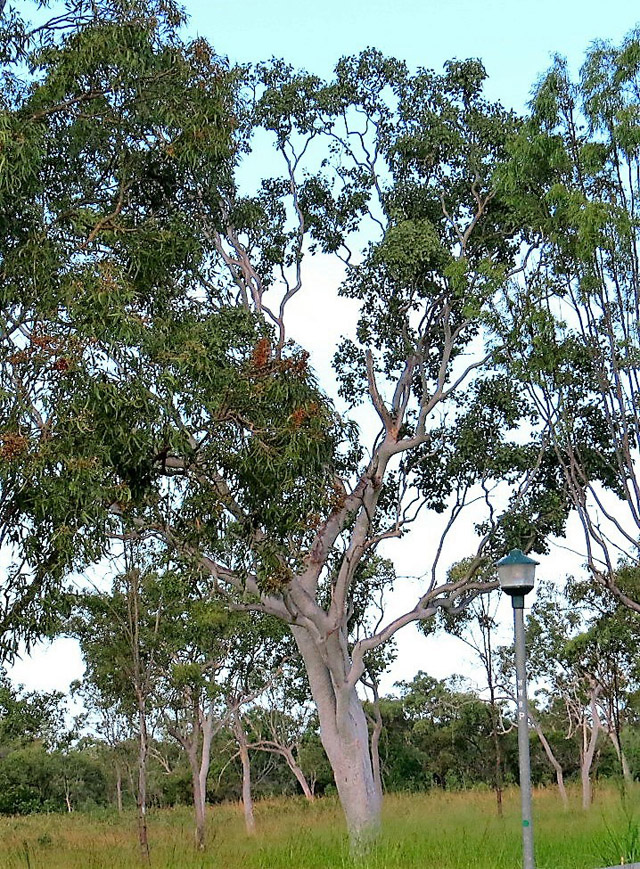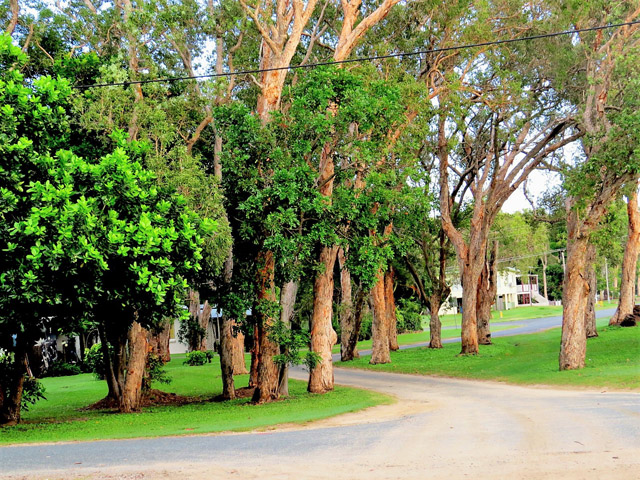
Growing up in the 50s one of the conversation starters was that of the 'Widow Maker' which is a colloquial term utilised for want of a technical word - gum tree branches falling unexpectedly.
In recent years I am aware of quite a number of news reports of people (adults and children) being killed when such a branch fell – either on camping trips, bush walking, school excursions, resting under a tree or simple being in the wrong place at the wrong time.
The history of Australia is replete is 'widow maker' stories and I can personally recall many of those '60s and 70's television series such as Rush which had programs associated with such incidents.

Window Makers
What is apparent is that in the early period of Australia's development the 'widow maker' became such a common experience that it gained such a reputation. Moreover it was not a case of one state, rather this was a situation that was common across the nation along with the apple state.
We lived for 14 years on a 10 acre bush block in Moruya (NSW south coast) where we constructed Basil Sellers House for the respite for Australian Institute of Sport elite athletes. It overlooked two deep gullies with a range of gum trees along with Ironbarks. Later we constructed a house on the other side of the 10 acre block looking across the two gullies to Basil Sellers House.
During the day the bell minors (Bellbirds) sang incessantly with bird song but in the hours of darkness it all went quite and a very quiet place it was. I can recall vividly on no less than eight or nine occasions hearing a crash and realising that a huge branch had fallen.
On three or four occasions it happened in daylight hours and one on one occasion I can recall actually looking at a tree in the distance and to my surprise and somewhat shock, watching as a huge branch simply dropped off an enormous gum tree.

Bush walks
Australia's Bush Orchestra was a bush walk under the canopy of the Ironbarks with the bird song in those years in Moruya that we had developed. It was not that difficult to find a pathway under the canopy that went no where near these larger trees – but where the optional bush path went across the gullies which was favourite for many, this was not so easy a task.
On legal advice we had large signs warning all visitors to the dangers of falling branches along with the 'widow maker' story and no one seemed to be too concerned, our own kids ran through these bush paths without giving any of this a second thought. The likelihood of having one of these branches fall, they deemed, to be inconsequential.
Yet to those few it has happened to, and taken their life, for them it was 100% but at the time they neither knew the danger, gauged the danger to be minimal or considered the danger way less than a motor car accident or some home based accidental death.
Early Australian history nonetheless is remarkable in that the 'widow maker' had gained such notoriety in the hearts and minds of early settlers as they cleared the land or found their way through uncharted bush land. It was as common a death among their men folk as anything.
Many a story of an experienced Australian bushman reveals that they can look at a tree with the proclivity of becoming a 'widow maker' and can gauge in their mind whether that tree or branch / branches is in a dangerous mode. The problem is that such a tree may hold good for another few years or more, then suddenly it succumbs.
From my experience in Moruya, knowing stories of old, hearing them discussed over and over again growing up, and seeing such huge branches fall without any warning or indeed expectation, I am well cautious of being under such large trees.

Heavy rains
Some years ago at Tweed Heads we had a great deal of rain and high winds, several trees had fallen on houses and cars around the area. We had two very large trees a little way behind the house and the SES gave us the okay to remove them as there was at least a modicum of a chance of them falling.
When the professional tree cutters came one of the discussion points that came up was the 'widow maker' and they were not short on stories when going up a tree to start cutting from the top down, branches fell. Those on the ground were constantly told to keep a wide berth.
The 'widow maker' reminds me so much of the unexpected and if there is anything the Scriptures speak of is the unexpected. I can recall many such evangelistic messages when young at youth rallies and Sunday evening outreach sermons from various preachers – the common response was 'it won't happen to me'.
Like the 'widow maker', sadly it does to young people through motor vehicle accidents, industrial accidents and even sporting events. The Christian message is to be ready and prepared with a heart refreshed by repentance and rejuvenated with forgiveness.

 Dr Mark Tronson is a Baptist minister (retired) who served as the Australian cricket team chaplain for 17 years (2000 ret) and established Life After Cricket in 2001. He was recognised by the Olympic Ministry Medal in 2009 presented by Carl Lewis Olympian of the Century. He mentors young writers and has written 24 books, and enjoys writing. He is married to Delma, with four adult children and grand-children. Dr Tronson writes a daily article for Christian Today Australia (since 2008) and in November 2016 established Christian Today New Zealand.
Dr Mark Tronson is a Baptist minister (retired) who served as the Australian cricket team chaplain for 17 years (2000 ret) and established Life After Cricket in 2001. He was recognised by the Olympic Ministry Medal in 2009 presented by Carl Lewis Olympian of the Century. He mentors young writers and has written 24 books, and enjoys writing. He is married to Delma, with four adult children and grand-children. Dr Tronson writes a daily article for Christian Today Australia (since 2008) and in November 2016 established Christian Today New Zealand.
Mark Tronson's archive of articles can be viewed at http://www.pressserviceinternational.org/mark-tronson.html

Dr Mark Tronson - a 4 min video
Chairman – Well-Being Australia
Baptist Minister 45 years
- 1984 - Australian cricket team chaplain 17 years (Ret)
- 2001 - Life After Cricket (18 years Ret)
- 2009 - Olympic Ministry Medal – presented by Carl Lewis
- 2019 - The Gutenberg - (ARPA Christian Media premier award)
Gutenberg video - 2min 14sec
Married to Delma for 45 years with 4 children and 6 grand children